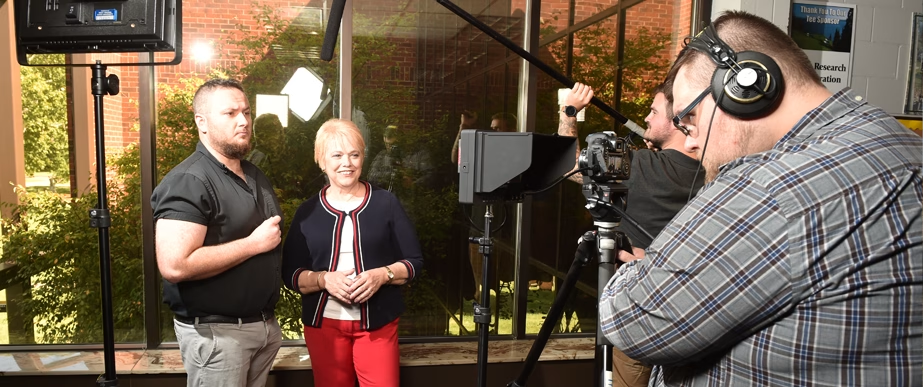The M.A. in Media Studies is an integrated, interdisciplinary program intended for students with a traditional undergraduate education and some experience in communications and digital media.
Students graduating with this degree, unique in West Virginia, are ideally suited to take advantage of the expanding job possibilities in graphic design, digital video production, interactive media and multimedia production, electronic publishing, health communications, and on-line information services. Media Studies graduates are prepared for careers as communication experts in such venues as commerce and industry, education, entertainment, health care, government and the not-for-profit sector.
Graduates are also prepared to continue their graduate work toward a doctoral degree. Students will graduate with design, technical, and critical skills and will be well-equipped to address the many challenges faced by corporations, small businesses, government agencies, non-profit organizations and educational institutions as they venture into the digital millennium.
The Media Studies programs offers three tracks: Theory & Criticism, Digital Media, and Public Health Communications. The Public Health Communications Track is 100% online.
Curriculum – Graduate Program in Media Studies
Master of Arts in Media Studies36 hours required for graduation
For Digital Media Concentration or Media Theory and Criticism Concentration:
Foundation Core Requirements
Nine hours. MS 500 (Digital Storytelling), MS 503 (Mass Communication Theory), MS 502 (Graduate Research and Writing)
Advanced Core Requirements
Six hours. Choose 1 (one) three-hour course at the 600 level from each of the two program concentrations (Digital Media, Media Theory & Criticism)
Concentration
Nine hours. Students choose three courses in one approved area of concentration. Six hours can be independent studies courses.
Digital Media
Choose three courses from MS 510, 541, 543, 548, 560, 565, 600, 610, 630, 640 or 660.
Media Theory & Criticism
Choose three courses from MS 505, 515, 561, 635, 645 or 655
Electives
Three hours. Any 500– or 600-level course.
Thesis/Project Requirement: 6 hours. The thesis or project requirement requires students to conduct and complete independent research that is relevant to the theoretical issues and topics covered in the M.A. program and demonstrates familiarity with, and skill in, applying appropriate research methods. Alternatively, students can choose to complete a comprehensive media project, which may, for example, be relevant to their employment (e.g. as videographers, teachers, media specialist) as well as a detailed written evaluative report demonstrating its relevance to the program. Click here for a PDF version of the Thesis/Project PROPOSAL Guidelines. Click here for a curriculum work sheet to help you plan your classes.
For Public Health Communications Concentration: (100% on-line)
Foundation Core Requirements
Nine hours. MS 502 (Graduate Research & Writing), MS 505 (Media Research), and MS 590 (Media Ethics: Public Health Communications)
Advanced Core Requirements
Six hours. MS 691 (Public Health & Government Relations), MS 692 (Public Health & Media Engagement)
Public Health Communication Concentration
Nine hours. MS 515 (Public Relations Theory & Practice), MS 591 (Global Health Communications), and MS 695 (Integrated Media Management)
Electives
Six hours. Any 500– or 600-level course.
Thesis/Project Requirement
Six hours. The thesis or project requirement requires students to conduct and complete independent research that is relevant to the theoretical issues and topics covered in the M.A. program and demonstrate familiarity with, and skill in, applying appropriate research methods. Alternatively, students can choose to complete a comprehensive media project, which may, for example, be relevant to their employment (e.g. as public health professionals, health care workers, non-profit leadership, videographers, teachers, media specialists, etc.) as well as a detailed written evaluative report demonstrating its relevance to the program. Click here for a PDF version of the Thesis/Project PROPOSAL Guidelines.
To apply download the application below.
